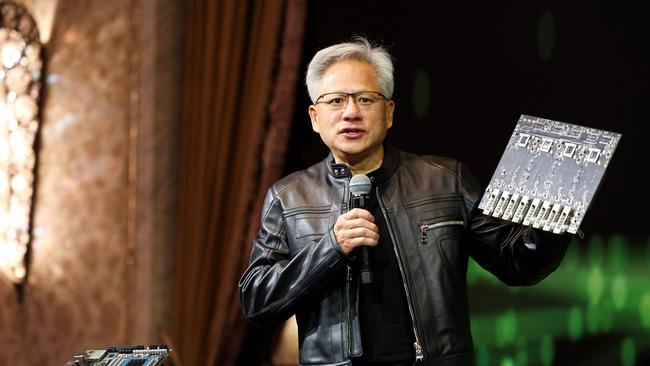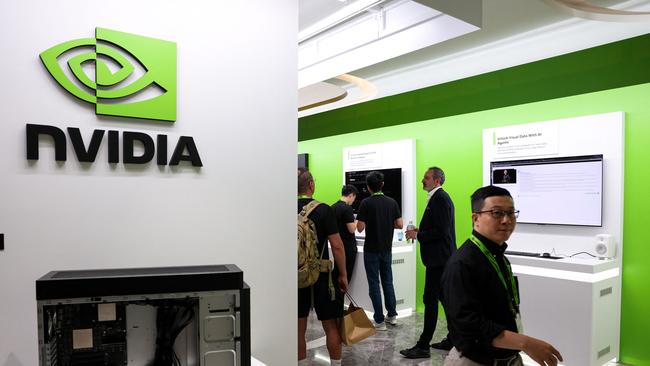Nvidia boom gives James Packer and Telstra a billion reasons to smile
The tech giant shakes off fears that China’s low-cost DeepSeek AI model would scuttle its business, with its powerful chips in more demand than ever.

Nvidia has shaken off fears that China’s low-cost DeepSeek artificial intelligence model would scuttle its business, with its powerful chips in more demand than ever.
Despite being effectively shut-out of China, one of the world’s biggest markets for advanced AI chips, the $US3.29 trillion ($5.13 trillion) company, has delivered another quarter of record-breaking sales.
This is good news for local investors, including James Packer – who has about a $250m holding, Sydney-based Alphinity Investment Management and Telstra.
The chip titan has been on a rollercoaster since the start of the year, with China’s shock announcement of DeepSeek in January wiping almost $1 trillion off its market value.
DeepSeek developed an AI model that could compete with the best in America such as ChatGPT, Anthropic’s Claude and Google Gemini, despite being barred from accessing Nvidia’s most advanced chips.

Investors feared that tech companies may not need Nvidia’s most powerful processors to develop AI models, although others – such as JJ Fiasson who developed Australia’s homegrown AI model Leonardo – said DeepSeek would have still needed access to significant computing power during its experimentation stages.
And China had a one-year gap to get their hands on powerful US chips.
Regardless, Nvidia’s revenue vaulted 69 per cent to $US44.06bn in the three months to April 27 – beating Wall Street’s expectations of $US43.28bn. And it could have generated more sales if it wasn’t stopped by new limits from Washington to export to China.
It could not ship about $US2.5bn of its H20 processors and said the policy cost it about $US8bn in lost revenue for the quarter.
Nvidia also incurred a $US4.5bn charge in the quarter from excess H20 inventory.
Founder and chief executive Jensen Huang warned cutting off China would have global consequences, and shielding Chinese developers from US competition “only strengthens them abroad”.
“With half of the world’s AI researchers based there, the platform that wins China is positioned to lead globally,” Mr Huang said on Nvidia’s earnings call.
But while the Trump administration has limited sales to China, it has cleared the way to sell to other countries, including multi-billion dollar processing deals in the Middle East.
Gross margins for the quarter were 60.5 per cent and 61 per cent on non-GAAP basis. Excluding the $US4.5bn charge, its non-GAAP margin would have been 71.3 per cent.
Net income surged 27 per cent to $US18.78bn. This was lower than analyst expectation of $US19.49bn.

Mr Huang said that Nvidia’s Blackwell NVL72 AI supercomputer – “a thinking machine designed for reasoning” – was now in full production. He said demand for AI agents, which can perform a variety of tasks autonomously, would further accelerate demand for AI computing.
“Global demand for NVIDIA’s AI infrastructure is incredibly strong,” he said.
“Countries around the world are recognising AI as essential infrastructure — just like electricity and the internet — and Nvidia stands at the centre of this profound transformation.”
US tech behemoths are also still spending big on Nvidia chips, with Microsoft, Amazon, Google and Facebook owner Meta investing tens of billions of dollars in AI development this year.
Mr Huang says “physical AI” was the next “frontier” of the technology. This is AI that has the ability to allow autonomous machines to “perceive, understand and perform complex actions” in the real or physical world, and he said earlier this year it represented a “multi-trillion opportunity”.
For the current quarter, Nvidia has projected revenue of $US45bn, “plus or minus 2 per cent”, while analysts expect it to deliver $US45.92bn.
Nvidia will pay its next quarterly cash dividend of $U1c a share on July 3.
Originally published as Nvidia boom gives James Packer and Telstra a billion reasons to smile



